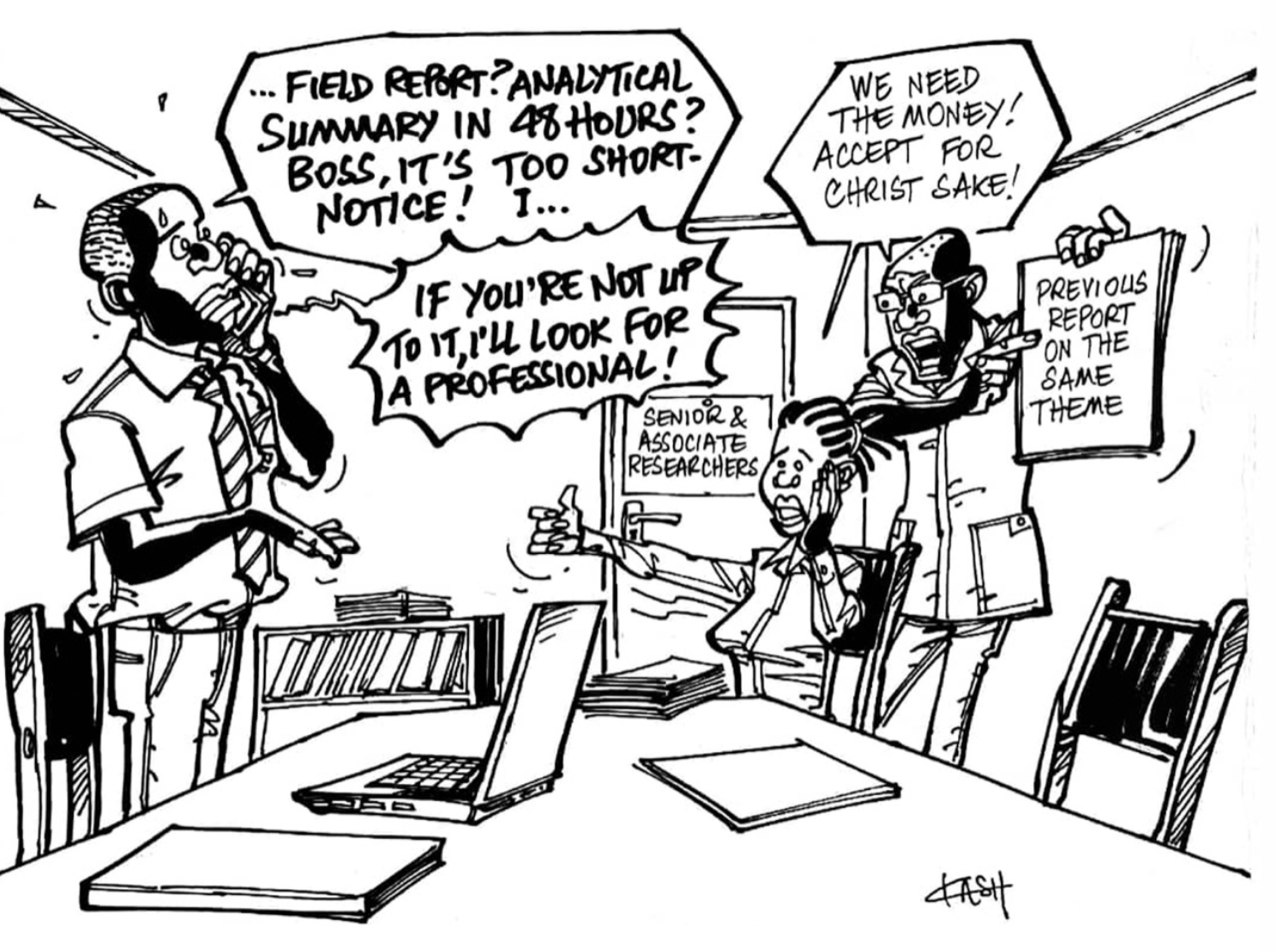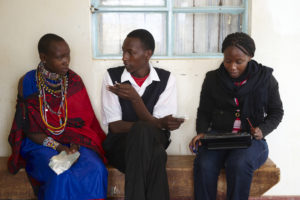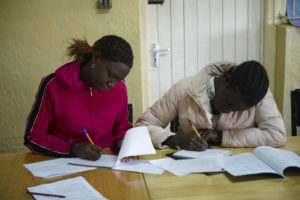Collecting data
Collecting data requires building and maintaining relationships with diverse stakeholders as well as with research participants. When thinking about research participants, we need to carefully consider the complex interplay between vulnerability and agency.
The first two resources in this section, Lange et al. (2013) and Rogers et al. (2012), deal with the notion of vulnerability. They add complexity to our analysis of who among research participants is vulnerable by contextualising vulnerabilities and elaborating on different types of vulnerability. In this way they encourage researchers to avoid blanket statements about vulnerability and autonomy, instead adopting a more nuanced approach.
The paper by Otieno Nyambedha (2008) provides a case study exploring the vulnerabilities of communities affected by HIV in Kenya and how ethical issues that arose in the course of the work were addressed through community dialogue and feedback. Another example of context and community specific approaches to vulnerability is a paper by Molyneux et al. (2016) on community engagement with gay, bisexual and other men who have sex with men in a context where homosexuality is illegal. Molyneux et al. (2016) note that ethical dilemmas encountered were “related to interactions and relationships between individuals operating at different levels or positions in health/research systems [and that] potential ‘solutions’ to dilemmas often lead to new issues and complications.”
Drawing on data from Kenya, the paper by Kamuya et al. (2017) studied gendered household processes and how they shape, and can be shaped by, interactions with field workers. The second resource by Kamaya et al. (2014) has a focus on fieldworkers as the gatekeepers and conduits of benefits to communities and how this challenging position is navigated in practice. Also focusing on field workers, Kingori and Gerrets (2016) explore the reasons underpinning fabrication in process of collecting data. They found that:
“…Fabrications were motivated by irreconcilable moral concerns, faltering morale resulting from poor management, and inadequate institutional support. To fieldworkers, data fabrication constituted a ‘tool’ for managing their quotidian challenges. Fabrications ranged from active to passive acts, to subvert, resist and readdress tensions deriving from employment inequalities and challenging socio-economic conditions.”
House et al. (2016) raise important questions for ethical enquiry in the face of political and other disruptions in the settings under enquiry. This paper provides generalisable lessons for those working in real world settings which are subject to rapid change and instability.
Useful resources

Remunerating Researchers from the Global South: A Source of Academic Prostitution?
Remunerating Researchers from the Global South: A Source of Academic Prostitution? While researchers from the Global North are granted a guaranteed salary, risk funds, and various forms of insurance, the same cannot be said for research assistants. The remunerative discrepancy between these two groups is a form of discrimination. It creates an imbalance between researchers […]
A systematic review on ethical challenges of ‘field’ research in low-income and middle-income countries: respect, justice and beneficence for research staff?
Primary data collection in low-income and middle-income countries (LMICs) is associated with a range of ethical complexities. Considerations on how to adequately ensure the well-being of research staff are largely neglected in contemporary ethics discourse. This systematic review aims to identify the ethical challenges that research staff across different hierarchical levels and scientific disciplines face […]
Vulnerability in research ethics: a way forward
Several foundational documents of bioethics mention the special obligation researchers have to vulnerable research participants. However, the treatment of vulnerability offered by these documents often relies on enumeration of vulnerable groups rather than an analysis of the features that make such groups vulnerable. Recent attempts in the scholarly literature to lend philosophical weight to the […]
Why bioethics needs a concept of vulnerability
Concern for human vulnerability seems to be at the heart of bioethical inquiry, but the concept of vulnerability is under-theorized in the bioethical literature. The aim of this article is to show why bioethics needs an adequately theorized and nuanced conception of vulnerability. We first review approaches to vulnerability in research ethics and public health […]
Ethical dilemmas of social science research on AIDS and orphanhood in Western Kenya
This paper is based on the experiences drawn from a long-term social science research programme on the impact of the AIDS pandemic on orphanhood in western Kenya. It discusses the ethical dilemma of maintaining a delicate balance between research ethics, the expectations of the study population and negotiating the community’s vested interests in a health-related research project […]
Public/community engagement in health research with men who have sex with men in sub-Saharan Africa: challenges and opportunities
Community engagement, incorporating elements of the broader concepts of public and stakeholder engagement, is increasingly promoted globally, including for health research conducted in developing countries. In sub-Saharan Africa, community engagement needs and challenges are arguably intensified for studies involving gay, bisexual and other men who have sex with men, where male same-sex sexual interactions are […]
Gendered negotiations for research participation in community-based studies: implications for health research policy and practice
There is a growing literature documenting the complex realities of consent processes in the field, and the negotiations and ethical dilemmas involved. Much has also been written about how gender and power shape household decision-making processes. However, these bodies of literature have rarely been brought together to inform research theory and practice in low-income settings. […]
“When they see us, it’s like they have seen the benefits!” experiences of study benefits negotiations in community-based studies on the Kenyan Coast
Benefit sharing in health research has been the focus of international debates for many years, particularly in developing countries. Whilst increasing attention is being given to frameworks that can guide researchers to determine levels of benefits to participants, there is little empirical research from developing countries on the practical application of these frameworks, including in […]
Morals, morale and motivations in data fabrication: Medical research fieldworkers views and practices in two Sub-Saharan African contexts
Data fabrication, incorrect collection strategies and poor data management, are considered detrimental to high-quality scientific research. While poor data management have been occasionally excused, fabrication constitutes a cardinal sin and scientific misconduct. Scholarly examinations of fabrication usually seek to expose and capture its prevalence and, less frequently, its consequences and causes. Most accounts centre on […]
To research (or not) that is the question: ethical issues in research when medical care is disrupted by political action: a case study from Eldoret, Kenya
While considerable attention has been focused on understanding the myriad of ethical analysis in international research in low- and middle-income countries, new issues always arise that have not been anticipated in guidelines or studied extensively. The disruption of medical care arising as a direct result of political actions, including strikes, post-election violence and related activities, […]
Unethical ethics? Reflections on intercultural research practices
The notion that there is a universal ethics is commonly supposed, but less often explicitly discussed, in protocols for ethical procedures in research. In this article, the authors reflect on their action-research with women farmers in a Bolivian highland province. Their project aims to propose ways in which local health services could better serve these […]
Editorial: Ethics and ethnography in medical research in Africa. Social Science & Medicine
By summarising papers delivered at a conference in Kilifi, Kenya this article provides useful learning on relationships in the health research process. The authors argue that more should be done to understand the ethics of relationships between “whole populations, the functioning of research institutions, the processes of collaboration, and the ethics of inequitable international relations.” […]
Private talk: Testimony, evidence, and the practice of anonymization in research
Anonymity is accepted as necessary for the generation of empirical knowledge concerning human research participants, especially for members of “vulnerable” groups. In particular, anonymity has been given a role in easing the challenges of giving voice to experiences that disrupt familiar and convenient paradigms of knowledge. This paper troubles such a notion, on the grounds […]
Ethics and the ethnography of medical research in Africa
The ethics of medical research have grown as an area of expertise and debate in recent years, with two broad approaches emerging in relation to transnational research: (1) the refinement of guidelines and strengthening of review, processes primarily to protect the right of individual research participants and strengthen interpersonal relations at the micro-level; and (2) […]
Global health research in an unequal world: ethics case studies from Africa
This book is a collection of fictionalised case studies of everyday ethical dilemmas and challenges, encountered in the process of conducting global health research in places where the effects of global, political and economic inequality are particularly evident. It is a training tool to fill the gap between research ethics guidelines and their implementation on […]
Experiencing everyday ethics in context: Frontline data collectors perspectives and practices of bioethics
Data collectors play a vital role in producing scientific knowledge. They are also an important component in understanding the practice of bioethics. Yet, very little attention has been given to their everyday experiences or the context in which they are expected to undertake these tasks. This paper argues that while there has been extensive philosophical […]
Research Involving Health Providers and Managers: Ethical Issues Faced by Researchers Conducting Diverse Health Policy and Systems Research in Kenya,
There is a growing interest in the ethics of Health Policy and Systems Research (HPSR), and especially in areas that have particular ethical salience across HPSR. Hyder et al (2014) provide an initial framework to consider this, and call for more conceptual and empirical work. In this paper, we respond by examining the ethical issues that […]
Field workers at the interface
This issue of Developing World Bioethics includes a collection of papers on intermediary staff and volunteers working at the interface between research institutions and researchers, and the communities from which research participants are recruited. ‘Field worker’ – a short hand commonly used in many research settings – refers here to those whose main role is […]




